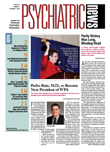An invisible tragedy—that's how APA President Nada Stotland, M.D., portrayed the human experience of uninsurance and underinsurance at the Opening Session of APA's Institute on Psychiatric Services last month in Chicago.
“Most of the people who need care and don't get it shuffle through,” she said in a speech in which she reiterated her determination to help APA members educate themselves about alternatives for health system reform that are likely to be considered under a new presidential administration.
“Some of [those who don't get needed mental health care] commit homicide or suicide, and some of them become homeless, and far too many of them wind up in jails or prisons,” Stotland said. “But many of them shuffle through, leaving scars on themselves, on their friends and families, and on their workplace.”
She related a conversation with a Wall Street Journal reporter who asked where patients go if they cannot afford their care. “I told her, 'It's hard for me to say these words, but often there is nowhere to get care.'
“So we never see the patient,” she said. “I believe when most of us as mental health professionals have a patient who comes upon an economic hard patch, we see them over it. We reduce their fees or whatever we have to do. But what about the millions of people who never come in the first place? Most people are not only not looking for a handout, they are mortified at the idea that they are getting something for free.
“Many of our patients give some other excuse, because they don't want to say they can't afford it, and they just go away,” Stotland said.“ So I'm concerned that so much of this crisis is invisible.”
Stotland has emphasized that she wants to provide venues at which APA members can learn about options for health system reform. “We spend more on health care per capita than any other country in the entire world, and we are way down the list in terms of the health we get for it,” she said.“ What are we doing wrong?”
At a session at last month's meeting, past APA President Steven Sharfstein, M.D., argued for a national, single-payer health insurance system in which he was countered by John Kay, J.D., the AMA Board of Trustees' only nonphysician member (see Single Payer or Individual Tax Credit: Which Reform Proposal Is Best?). Kay, standing in for AMA President Ron Davis, M.D., who could not attend because of illness, argued for the AMA's plan for health system reform. This plan relies on tax credits to enable individuals to buy their own insurance.
Stotland said psychiatrists could not afford to argue forever about their differences of opinion and maintained that compromise would be inevitable for APA to come to a consensus about what kind of reform it would advocate.
“We don't have a system,” she said of the existing hodgepodge of public and private health care payers. “So anything is going to be an improvement. Our choice is between trying to get a 100 percent buy-in from everyone, or 70 percent buy-in from most people.”
Speaking just one day before Congress approved the Paul Wellstone and Pete Domenici Mental Health Parity and Addiction Equity Act of 2008, Stotland hailed the achievement as “a step out of the dark ages” (see page 1; Psychiatric News, October 17).
She added, “Thanks to our advocacy, most Americans think that mental illnesses are real and should be covered by insurance.”
Stotland also said that conflict of interest throughout all of medicine continues to be a matter of public concern. And she reiterated the efforts APA had made as an organization over the years to deal with issues of conflict of interest, as well as those made to respond to Sen. Charles Grassley (R-Iowa) after his request to APA for information about pharmaceutical-industry relations (Psychiatric News, August 15, September 5).
“We have done nothing wrong,” Stotland said. “We haven't even been accused of anything.” ▪

